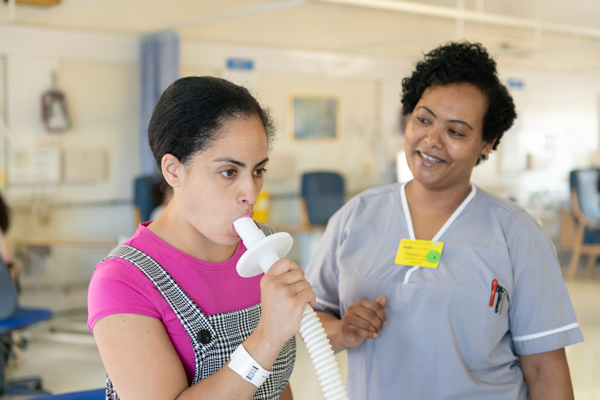Research by Royal Brompton's respiratory teams, published in the European Respiratory Journal Open Research, has found that patients feel they are having to 'fight' to be referred for an important procedure, despite it being recommended by the National Institute for Health and Care Excellence (NICE). 
Lung volume reduction is suitable for some patients with COPD (chronic obstructive pulmonary disease), a group of lung conditions that cause breathing difficulties. The procedure can have a significant impact on length and quality of life. The procedure involves removing damaged tissue, giving the healthy parts of the lungs more room to breathe. It sometimes involves an operation, but can also be done using a fibre-optic camera.
Fewer than 100 patients undergo the procedure each year in the UK. Dr Nick Hopkinson, honorary consultant physician at Royal Brompton Hospital, said: "These procedures can bring dramatic benefits to patients with COPD, so it's a real concern that people who may benefit from them are not being considered to see if they might be suitable for treatment."
The study involved collecting the experiences of patients with emphysema (a type of COPD) who had a lung volume reduction procedure at Royal Brompton or Glenfield Hospital in Leicester.
Dr Hopkinson said: "We heard throughout this study that patients had to wait a long time before eventually being referred to a specialist. Health professionals may not know about recent advances in lung volume reduction treatments, they may not be sure how to refer or they may think that procedures are riskier than they really are.
"Sadly, patients described to us how they had to fight to be referred for these procedures, which could have a significant impact on their quality of life."
"It's completely changed my life. It feels like I can breathe again"
Penny Rickman, 62, had been told since childhood that her shortness of breath was a result of asthma. It was only in 2002 - when Penny was 48 - that she learned she had emphysema, a form of COPD which damage the air sacs in the lungs.
Penny said: "My symptoms would suddenly worsen and it felt like there was an elephant sitting on my chest. I'd be really struggling to catch my breath at all. It was very frightening."
Despite regular visits to her GP over the next nine years whenever her condition deteriorated, Penny wasn't referred to a respiratory consultant for regular check-ups at her local hospital until 2011.
Penny's lung condition deteriorated to the point where she was dependent on a portable oxygen concentrator.
She was referred to Royal Brompton in 2014, where she was diagnosed with alpha 1 antitrypsin deficiency: a rare, inherited condition that can lead to people developing COPD early in life and may mean the disease progresses more quickly than usual.
Doctors at Royal Brompton offered Penny the chance to take part in a clinical trial of a new technique for lung volume reduction. Three endobronchial valves were implanted in her left lung, which allow air to leave damaged bronchi, but not to return. This reduces the amount of trapped air in the lung and means she can breathe more easily.
Penny said: "It's completely changed my life. It feels like I can breathe again, and I can do things I love without using the oxygen at all. The procedure has been absolutely life-changing for me."
Commenting on whether she should have been offered the procedure earlier, Penny said: "didn't know it was available. I just hope more people in my position ask their GP about whether they might be suitable, and I hope doctors realise what a difference it can make - I'm convinced it could benefit a lot more people."
< New procedure gives asthma sufferers hope
Trust experts help shape the future of respiratory medicine >
